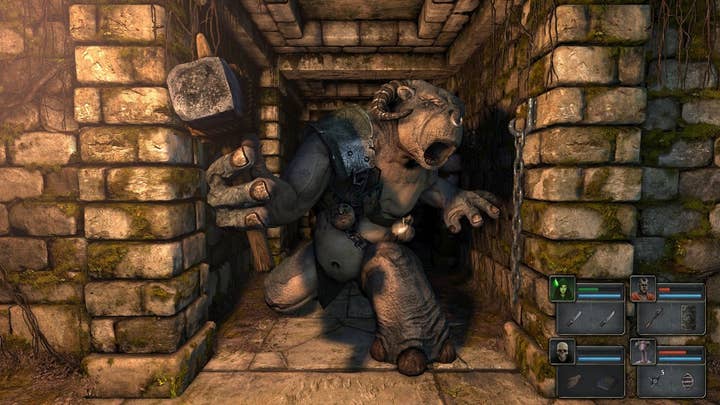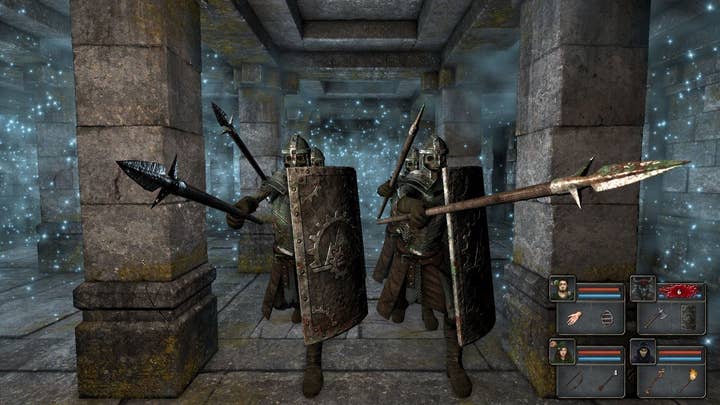Legend of Grimrock leaves no stone unpressed | Why I Love
Worm Jazz developer Yu He explains how the 2012 dungeon crawler was designed to draw players in
Why I Love is a series of guest editorials on GamesIndustry.biz intended to showcase the ways in which game developers appreciate each other's work. This entry was contributed by Yu He, whose puzzle game Worm Jazz launches on the PC for Steam and the Switch today.
My first memory of gaming was playing a racing game on what I later learned was a Watara Supervision. My dad got it for me on my birthday when I was six or seven years old. It had a monochrome display with extremely simple graphics, but I was hooked from the start. Since then, I have always considered myself a gamer. Just about all the allowance I earned each month would go towards games and you could be sure that every Christmas wish list included at least a game or two.
As an immigrant in a foreign country. I was often taught one thing at home, then something completely different at school. It was a confusing time, and being young and unable to understand cultural differences, I found it difficult to relate to my peers. I turned to games, both as something to distract myself with and because games had well-defined rules and win conditions. Finally, I had found something I could understand and master.
Later on, I discovered that other kids, like me, also played video games, and that through games we could have shared experiences even if our cultures were different. We borrowed games from each other and started visiting each other's homes just to hang out and play games on each other's consoles. Slowly, gaming became a way for me to connect with others as well.
Even though I have always considered myself a gamer, when people ask me about what kind of games I like, I never had a short, concise answer like "RPG" or "platformer." I still don't. However, if people really want to know, I'll tell them about Legend of Grimrock...
I never played the classic titles this game was inspired by, such as Dungeon Master or Eye of the Beholder. But somehow, this indie game from 2012 really resonated with me and made me think about what a game is and what it is that I love about the medium.
In Legend of Grimrock, you control a group of prisoners that have been condemned to Mount Grimrock, a dungeon constructed inside a mountain. The goal is to traverse the dungeon, reach the exit, and escape. Truth be told, I never pay much attention to story in games, and always skip cutscenes… Luckily, there aren't a lot of cutscenes in Legend of Grimrock. The story is told through the rich atmosphere and written in stone carvings scattered throughout the dungeon. Many of them also serve as hints for the player. Rather than having the story told to you, you discover it by exploring.
In terms of gameplay, Legend of Grimrock implements the same first-person view and grid-based movement as its source material and inspiration. However, rather than being a gimmick or just an homage to the classics, these constraints are used cleverly in every part of the game's design.
"The game awards meticulous exploration in every way"
You see, Legend of Grimrock is part RPG and part puzzle game. The role-playing part has you wander the monster-infested dungeon, slaying them in combat and managing the health and equipment of your party. However, in addition to a menagerie of monsters, the dungeons are also filled with secrets and riddles. A ton of them. Some are required to progress further into the dungeon while others are secrets that give you gear that may help you in combat. The game awards meticulous exploration in every way.
This is where constraining the player to a grid is a brilliant move; it makes discovering and exhausting every inch of the dungeon a goal in itself. You are never at a loss for what to do next. See an unexplored tile on the map? There's probably a secret there, ready to be discovered!
When I first saw the game, I thought the graphics looked stunning for an indie title. That's what made me pick it up in the first place. They still hold up, even today. What is fascinating is that there aren't a lot of assets in total, but each one is crafted with high attention to detail and lit to look as beautiful as possible. Not only does this approach make sense for an indie game, it also serves the game design in a brilliant manner.

For example, many of the secrets in the game will ask you to find a hidden passageway. As you wander the hallways of the dungeon, you end up staring at walls. A lot of walls. These walls all look exactly the same… except for that odd one out that doesn't. That's when you know there's a loose stone block you can push or a hidden passageway to uncover!
If the game had many different wall assets and variations, finding that secret would be less enjoyable, just more noise to filter through... But when everything is laid out in a regular grid fashion and every element only has one representation, every little detail and deviation from that regularity is all the more conspicuous and significant. Legend of Grimrock takes full advantage of this. It all comes together beautifully, making finding and solving every secret and riddle an incredibly satisfying experience.
I believe people enjoy games for different reasons. Some people resonate with games that tell a story they can relate to or find fascinating, an aesthetic that reminds them of something, or gameplay that tests their reflexes.
For me, games are about mastery. It's about fully comprehending a game's mechanics and how they play out in a world that is lovingly crafted for them. It's about discovery and trying to figure out the idea or intent behind every rule and object that is placed, and discovering that everything was purposeful and nothing was random. Ultimately, it's about connecting with the game's creators and every other player who played the game through a shared understanding of the experience.
Legend of Grimrock may be a single-player, solitary experience about being lost in a dungeon, but I never felt that way while playing it.
Developers interested in contributing their own Why I Love column are encouraged to reach out to us at news@gamesindustry.biz.

